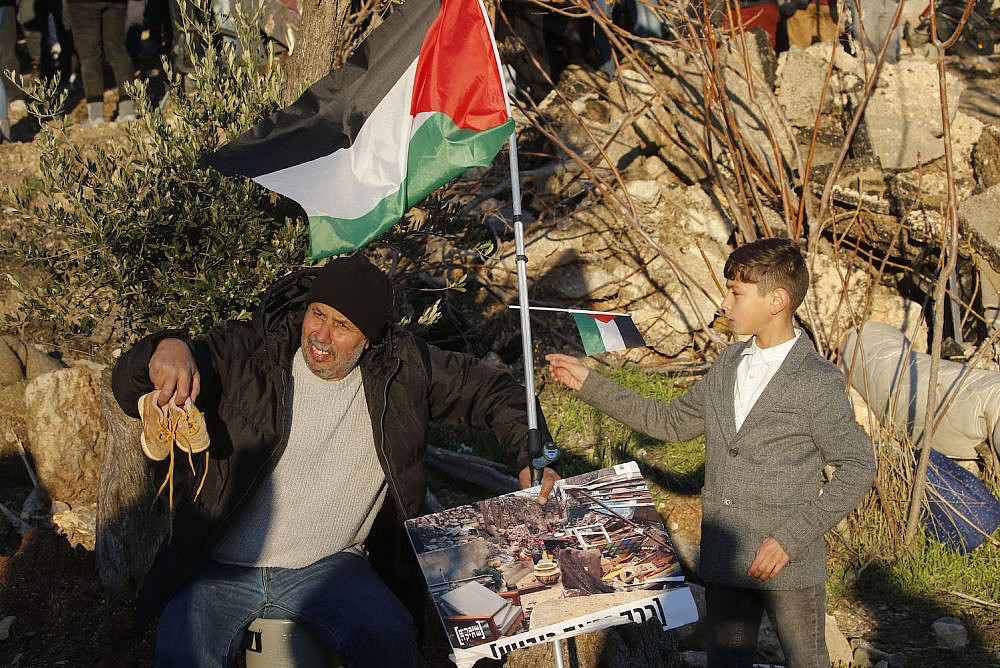This article originally appeared in “The Landline,” +972’s weekly newsletter. Subscribe here.
Cruelty is baked into Israeli apartheid. On Wednesday, in the dark hours before dawn, Israeli police cut power to the home of the Salhiyeh family in the Jerusalem neighborhood of Sheikh Jarrah. The authorities had been there two days earlier, ready to expel the family under the pretext of building a school on land expropriated by the municipality in 2017, until several residents carried gas canisters to the roof and threatened to blow up the house. Faced with such resistance and surrounded by reporters and diplomats, the police eventually backed down — but they clearly had other plans.
Upon cutting the electricity on Wednesday, officers stormed the house at 3:15 a.m., throwing stun grenades, dragging out the family members, and violently arresting several residents. Shortly afterward, a bulldozer began hacking away at the building; by sunrise, the home had been turned into rubble. Amid the wreckage and the freezing cold, Lital Salhiyeh, the mother of the household, asked: “How do they expect my children to grow up and not be full of anger and hatred against them?”
The destruction of the Salhiyeh home was designed to be cruel, both to the family and to all Palestinians watching. Cruelty is meant to terrify, demoralize, and incapacitate the colonized society. The state needs Palestinians to feel powerless, to feel trapped by the sense of failure, to feel robbed not just of the will to resist, but the will to live. It needs either their total submission to Israeli diktats or their complete erasure from the landscape. When the Salhiyehs refused the former, they were brutally subjected to the latter.
The policy of intentional cruelty was on stark display across the land this past week. A day before the Salhiyeh demolition, in the village of Umm al-Kheir in the South Hebron Hills, thousands attended the funeral of Haj Suleiman Hathaleen, an elderly nonviolent activist who was run over by an Israeli police tow truck while trying to stop the confiscation of unlicensed vehicles; the police simply drove away, leaving the beloved elder’s bones shattered while his family rushed to get him to the hospital.
A few kilometers away, on the other side of the Green Line, Israeli police continued arresting scores of Bedouin citizens in the Naqab who had been protesting the seizure of agricultural land near the village of a-Sa’wa al-Atrash, which the Jewish National Fund is excavating for a forestation project. A week earlier in the West Bank village of Jiljilya, Israeli soldiers arrested 80-year-old Palestinian-American Omar Abdulmajid As’ad, beat him, tied his hands, and abandoned him at a construction site in the freezing cold, leading him to die of a heart attack. All the while to the west, Israel kept the gates of Gaza shuttered, leaving two million Palestinians under a choking siege that is now entering its 15th year.
Palestinians are no strangers to such violence. Yet watching the ruins of the Salhiyeh home on Wednesday morning, many spoke of feeling a particularly searing pain, sunk by helplessness after the brief flicker of hope just days before. But then came their rage. And then came their resolve. Palestinians are always praised for their sumud, or steadfastness — but a resilient society is also a tortured one, often relying on plain stubbornness to pull through. Still, with foreign diplomats delivering little more than photoshoots at demolition sites and Jewish Israeli society remaining unperturbed by the costs of its supremacy, that stubbornness is the only thing that defies the cruelty when nothing else does.


